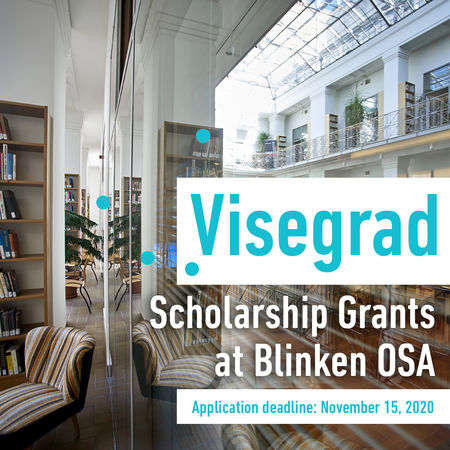We are happy to announce that the evaluation of the last submitted Visegrad applications has finished and the final list of winners and reserves has been approved by the Council of Ambassadors.
The theme for the Visegrad Scholarships at Blinken OSA in the fall of 2020/21
Possibilities of knowing: Truth-seeking in a polarized world and (in) its aftermath.
We would like to assess the potential of a genealogical project linking the contemporary epistemic crisis of democracy to past modes of inquiry.
Over the course of many years, we have invited applicants from the fields of history, arts, philosophy, and sociology to reflect on the conditions of knowledge production during and after the Cold War. This reflection exposes the intellectual and professional practices (journalistic, sociological, artistic, political, archival) that both reflected and shaped the meaning and scope of the Cold War phenomenon.
More about the Visegrad Scholarship at Blinken OSA
For a better and deeper understanding of the interdependent recent history of (the center of) Europe, the International Visegrad Fund offers fifteen research fellowship grants annually in the Vera and Donald Blinken Open Society Archives at Central European University, Budapest, on a competitive basis, to support scholars who wish to conduct research in the holdings of the Archives, and whose current research projects are relevant to the collections and the given research priorities of the Fund and Blinken OSA.
For detailed information on the call, please check the official Blinken OSA Visegrad Scholarship website.
The following candidates received full support:
• John/Jack Atmore (US) for his project Creating an Online Interactive Archival Documentary Platform with the Privát Fotó és Film Alapítvány Home Movie Collection
• Jelena Culibrk (Serbia) for her research Televising the Invisible Hand: The BBC and Postwar (Neo)Liberalism, 1968–1980.
• Svetlana Dimitrova (Bulgaria/France) for her research “Promoting Free Exchange Behind Closed Doors.” The Foundation for the Support of European Intellectuals in its Socio-Historical Context
• Samuel Finkelman (US) for his research How Soviet Jewish Intellectuals and Activists Mobilized the Past to Stimulate the Resurgence of Jewish National Consciousness
• Jira Janac (Czech Republic) for his research on Hydrosocialism
• Andrea Soós (Hungary) for her research on the oeuvre of László Rajk and his contribution to the social and political transformation of Hungary in the 1980s.
• Trinkle, Alice (Germany) for her research on “Understanding socialist economic reform as a global phenomenon.” Assessing exchanges between Europe and China and their influence on Chinese economic reform in the 1980s
The following candidates received partial support:
• Bewicz, Piotr (Poland) for his research Letters From The Inside. The Phenomenon of Experiencing Archive – The Open Society Archives Example
• Lilla Farkas (Hungary) for her research The Emergence of the Roma Rights Movement in the Last Years of Communism and its Immediate Aftermath


